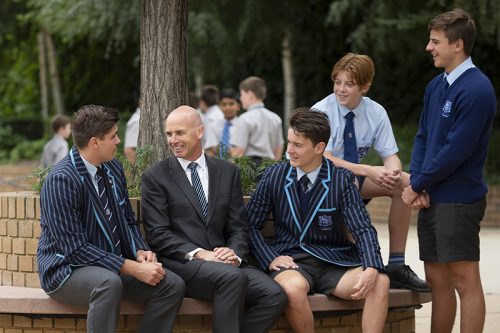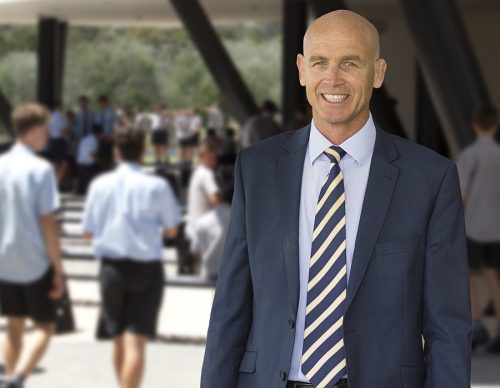
THERE is irrefutable evidence that boys and girls respond to the world differently, they require different approaches to help them grow, says Matthew Hutchison, headmaster of Marist College Canberra, a Catholic school for boys from Years 4 to 12.
“When comparing the average boy to the average girl, the gender differences in the area of language, emotions, impulse control and sensory reaction are due to differences in brain structure and its rate of development,” he says.
“Additionally, gender differences in cognitive skills such as verbal fluency, reading, spatial skills and learning styles most certainly are the result of changes to the brain, which are shaped by environmental influences of family, school and society.
“As the body of research grows supporting the notion of cognitive gender differences, so do the strategies for helping students learn in ways that best suit their ability.
“Research would further suggest that those strategies work best in a single-sex environment.”
Mr Hutchison says this has vast implications for learning, teaching and emotional development and reaffirms his belief that boys’ schools succeed for many boys.
“Despite such evidence, the role of single-sex schools in the present educational climate remains hotly debated,” he says.
Mr Hutchison, who is in his second year of leading Marist College Canberra (MCC) after eight years as head of school at Sydney’s St Augustine’s College, says: “We know boys need a safe, supportive and connected place where they can develop the skills to become confident and competent men.
“We believe at MCC that this happens best in an environment that gives boys the support to explore a variety of masculinities and avenues of endeavour without the limitations placed on tradition.
“MCC provides a place where students can learn in ways that match their capabilities, develop skills in communication with many different people, explore a wide variety of opportunities without limitation and discover what sort of man they will become.
“At MCC, the entire school community is organised programmatically and culturally, specifically in response to boys’ needs and potential. We seek to make our single-sex culture work for the good of the men these boys will become and together, we proudly create fine young men.”
‘Boys thrive in a culture that understands and celebrates them’

MATTHEW HUTCHISON, headmaster of Marist College Canberra, answers some frequently asked questions:
Q: What does the research tell us from a boy’s perspective?
A: Not all boys are the same, so teachers and schools should not blindly apply a “one-size-fits-all” approach. Research confirms the need for teachers in boys’ schools to employ pedagogical strategies tailored to boys’ developmental pace and build curricular content that can engage and involve more boys. At MCC we have a distinct “boy-centred approach” to pedagogy and curriculum which may not be easily implemented with the same sense of purpose, intensity and focus in a co-educational classroom.
Q: What pedagogical strategies are best tailored for boys?
A: I passionately believe it is time to face the evidence and start providing educational programs and opportunities that are designed for what boys bring to the classroom instead of telling them they could succeed if only they tried harder.
I have worked in boys’ schools for over 30 years. I appreciate many experienced colleagues long ago found their way to a set of practices that appear to work especially well for boys, although some may not be consciously aware of their pedagogical stance. In contrast, teachers who have transitioned from co-educational schools to a boys’ school are clearly able to articulate the need to re-orient their pedagogical practice. They know it is important to talk less, use humour and give short instruction with clear timelines. They understand they must get boys doing, they know boys respond to challenge, enjoy options with tasks and need clear rules and expectations.
Q: Do we need to redefine gender assumptions?
A: Research also informs us that some teachers in co-educational settings bring unconscious gender assumptions about student performance to their classrooms which polarise and label boys and girls. The sometimes negative discourse about boys ‘as a group’ in co-educational settings may actually generate and amplify gender group behaviour. Successful teachers in boys’ schools find their way to view boys as asset-rich. In these classrooms, the differences among boys come more clearly into focus, removed from gender bias and stereotyping. Effective teaching in an all-boys’ classroom sets up opportunities to reset their performance expectations where academic success is measured by boys’ achievement and not by girls.
Q: Do boys’ schools present a narrow understanding of masculinity?
A: It is often assumed that boys’ schools are incubators of dominant masculinity. I believe boys’ schools have a unique opportunity to expose the negative strands in the social construct of masculinity. We believe MCC succeeds in teaching boys that there are many routes to becoming a good man and many expressions of manhood. Being schooled with other boys often creates a culture to question, reflect, adjust and grow – to ask uncomfortable questions and share ideas without fearing ready judgement. Boys at MCC can explore issues of gender and sexuality and the many versions of manhood in an authentic, testing way that might not work for them in a different environment.
At MCC we strive to create a community where compassion, gentleness and kindness are foremost in hearts, minds and mission. We teach a thoughtful, sensitive and dignified notion of manhood. Our success stems from many reasons, including teaching young men moral values and principles that strengthen our society and that model kindness, tolerance, empathy and, especially, respect At MCC for our women.
At MCC for our women. boys learn that real men read, cry, listen, talk about what matters to them, take care of others, engage art. They in learn philosophical that real discussions men can change tyres, nappies and their minds.
Q: Do you have to be good at sport to attend a boys’ school?
A: It is self-evident that in a boys’ school wide-scale participation in school co-curricular activities, often over represented by girls in co-educational schools, are naturally filled by boys. Boys feel free to pursue their interests in a single-sex environment without preconceived notions of rigid gender expectations that too often regulate their decisions, discourage risk and limit their opportunities to discover their talents.
The high rates of participation in co-curricular activities at MCC are an expectation by the school and the boys themselves. As boys progress through MCC, it is striking to see them thrive in their particular passions as sportsman, musicians or debaters, but also as actors, programmers or chess players. No one activity dominates.
Q: What is special about teaching boys?
A: We know boys thrive in a culture that understands, accepts and celebrates them. I have always believed that to work in a boys’ school you have to like boys. This would seem obvious but teachers in boys’ schools have to enjoy their “have-a-go attitude”, their humour and the sense of fun they bring to the classroom. Boys want to know their teachers value them and have a genuine interest in their welfare. The once given of advice of “not smiling before Easter” is the most ill-informed instruction to a teacher of boys. In boys’ schools, teachers need to talk to boys so that they will listen and listen to boys so they will talk. This allows us to nurture each boy as they try to figure out how to live in this world.
Who can be trusted?
In a world of spin and confusion, there’s never been a more important time to support independent journalism in Canberra.
If you trust our work online and want to enforce the power of independent voices, I invite you to make a small contribution.
Every dollar of support is invested back into our journalism to help keep citynews.com.au strong and free.
Thank you,
Ian Meikle, editor




Leave a Reply